The 2020 Mac Mini Unleashed: Putting Apple Silicon M1 To The Test
by Andrei Frumusanu on November 17, 2020 9:00 AM ESTBenchmarks: Whatever Is Available
As we’ve had very little time with the Mac mini, and the fact that this not only is a macOS system, but a new Arm64-based macOS system, our usual benchmark choices that we tend to use aren’t really available to us. We’ve made due with a assortment of available tests at the time of the launch to give us a rough idea of the performance:
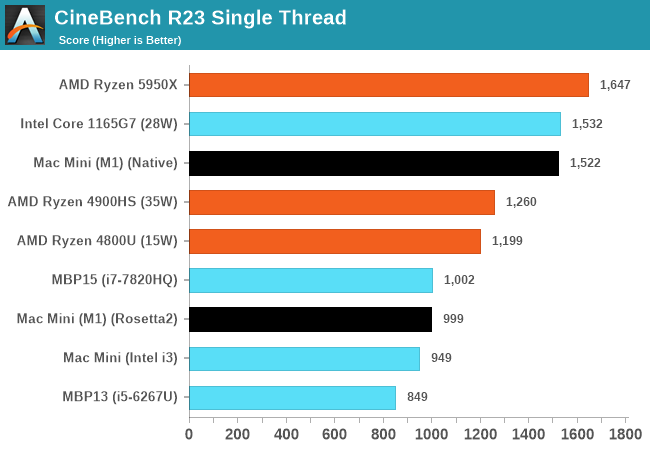
One particular benchmark that sees the first light of day on macOS as well as Apple Silicon is Cinebench. In this first-time view of the popular Cinema4D based benchmark, we see the Apple M1 toe-to-toe with the best-performing x86 CPUs on the market, vastly outperforming past Apple iterations of Intel silicon. The M1 here loses out to Zen3 and Tiger Lake CPUs, which still seem to have an advantage, although we’re not sure of the microarchitectural characteristics of the new benchmark.
What’s notable is the performance of the Rosetta2 run of the benchmark when in x86 mode, which is not only able to keep up with past Mac iterations but still also beat them.
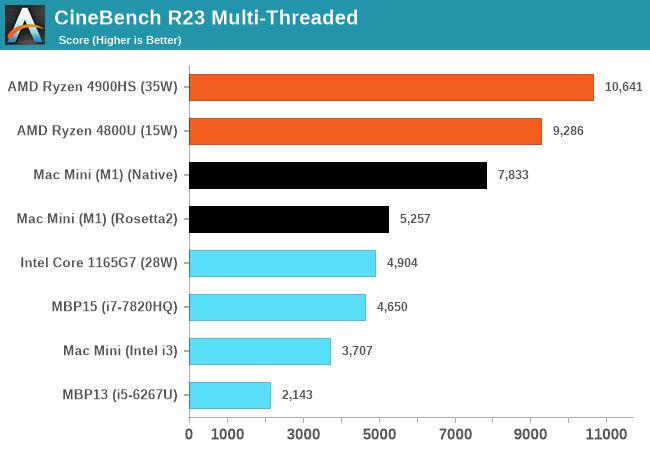
In the multi-threaded R23 runs, the M1 absolutely dominates past Macs with similar low-power CPUs. Just as of note, we’re trying to gather more data on other systems as we have access to them, and expand the graph in further updates of the article past publishing.
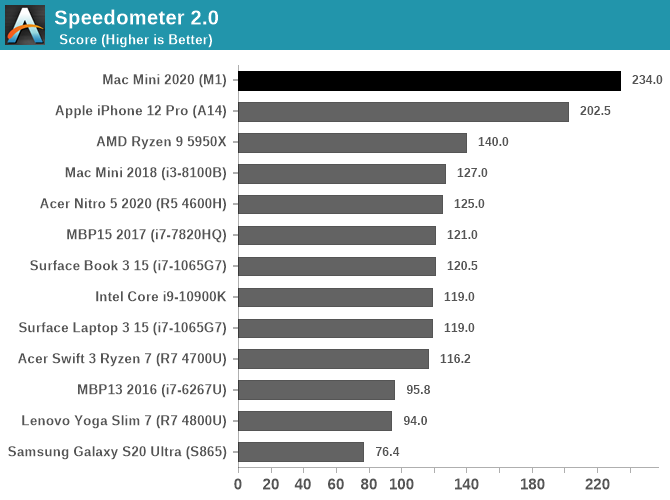
In browser-benchmarks we’ve known Apple’s CPUs to very much dominate across the landscape, but there were doubts as to whether this was due to the CPUs themselves in the iPhone or rather just the browsers and browser engines. Now running on macOS and desktop Safari, being able to compare data to other Intel Mac systems, we can come to the conclusion that the performance advantage is due to Apple’s CPU designs.
Web-browsing performance seems to be an extremely high priority for Apple’s CPU, and this makes sense as it’s the killer workload for mobile SoCs and the workload that one uses the most in everyday life.
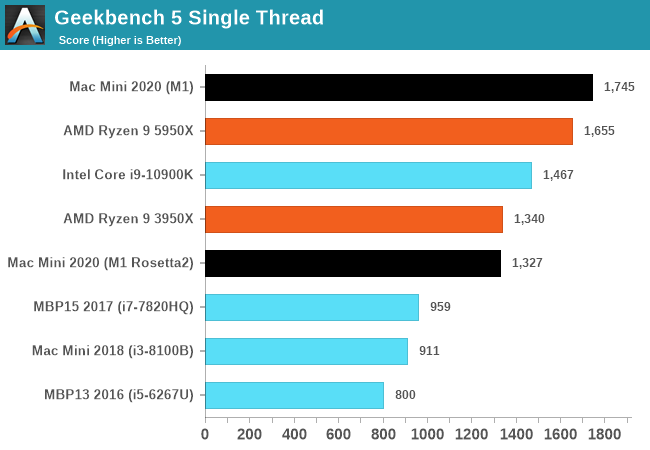
In Geekbench 5, the M1 does again extremely well as it actually takes the lead in our performance figures. Even when running in x86 compatibility mode, the M1 is able to match the top single-threaded performance of last generation’s high-end CPUs, and vastly exceed that of past iterations of the Mac mini and past Macbooks.
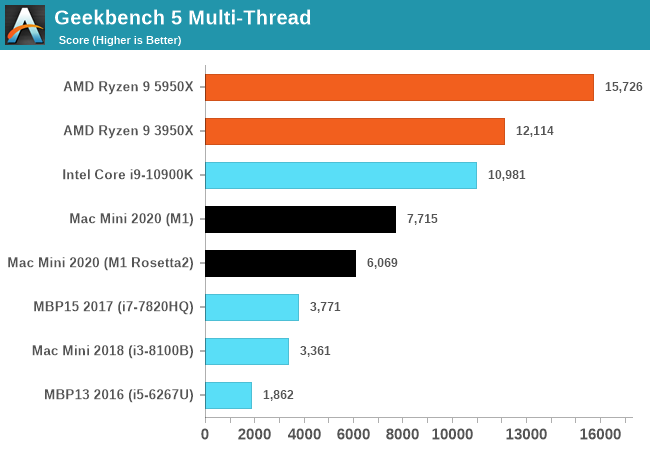
Multi-threaded performance is a matter of core-count and power efficiency of a design. The M1 here demolishes a 2017 15-inch Macbook Pro with an Intel i7-7820HQ with 4 cores and 8 threads, posting over double the score. We’ll be adding more data-points as we collect them.


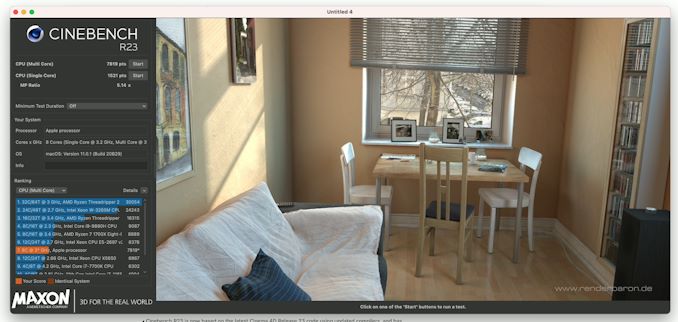








682 Comments
View All Comments
YesYesNo - Tuesday, November 17, 2020 - link
It is also the fastest chip they have shipped so far.Spunjji - Thursday, November 19, 2020 - link
Useless response is useless.BushLin - Tuesday, November 17, 2020 - link
So what higher spec chip have Apple announced? There's lower spec versionsHrunga_Zmuda - Wednesday, November 18, 2020 - link
That there is a straw man. Apple practically never announces ahead of time what they are going to bring out.Spunjji - Thursday, November 19, 2020 - link
Apparently some people get up in their feelings when other people use the present to extrapolate to a likely future 🤷♂️BushLin - Thursday, November 19, 2020 - link
There's a difference between discussing what might be vs. "this is the slowest M chip Apple will ever ship" which to me sound like declaring a certainty... And the only people who are in a position to make such a statement is Apple, and they haven't.Spunjji - Monday, November 23, 2020 - link
It *is* a certainty. They've announced that they'll transition their entire range, which means more chips to come. The remaining products in the Mac lineup sit higher in the stack, so the next chips will have higher performance. Unless you can think of a lower product category in their lineup than the ones serviced by M1, there's no reason for them to release an M chip with a lower spec than this one - everything below the MacBook Air is already covered by A14.This is simple logic, and you're being needlessly obtuse.
BushLin - Monday, November 23, 2020 - link
Not obtuse. It wouldn't be out of character for apple to abandon the high end and target the M1for the much bigger market below that.Maybe you're right and there are higher clocked/higher core count versions on the way but the only certainty is in your mind.
Kirfkin - Tuesday, November 17, 2020 - link
I'm impressed. It's definitely better than I expected. I didn't think ARM performance would be there QUITE yet. It'll be interesting as more applications and games etc make it to Native ARM. I suspect performance will be up and down, but this is absolutely impressive.(I use both x86/AMD64 machines and ARM machines such as the Pinebook Pro; I'd absolutely love to see ARM succeed if it ultimately proves better).
haghands - Tuesday, November 17, 2020 - link
I really hope that somehow some of the engineering advances they've made with these chips are able to influence ARM IP in te rest of the industry. Obviously Apple doesn't want this and will in fact do everything in their power to prevent it, but I'm sure other vendors are studying these things closely and I hope it bears fruit lol. Who knows, maybe even some of their engineers leave Apple at some point to help build up some more open platforms, that's exactly what Chris Lattner of LLVM/CLANG and Swift did after all.